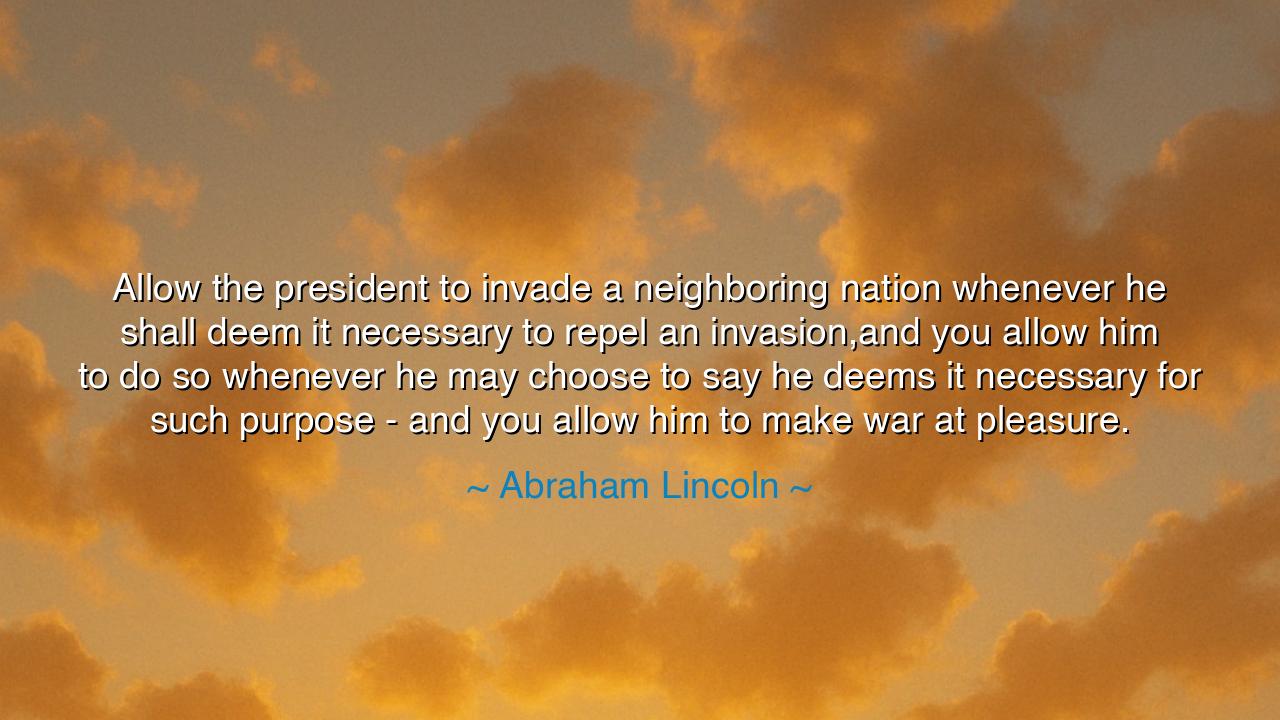
Allow the president to invade a neighboring nation whenever he
Allow the president to invade a neighboring nation whenever he shall deem it necessary to repel an invasion,and you allow him to do so whenever he may choose to say he deems it necessary for such purpose - and you allow him to make war at pleasure.






Hear, O seeker of wisdom, the stern warning of Abraham Lincoln: “Allow the president to invade a neighboring nation whenever he shall deem it necessary to repel an invasion, and you allow him to do so whenever he may choose to say he deems it necessary for such purpose—and you allow him to make war at pleasure.” These words are not the boast of a conqueror, but the lament of a statesman who foresaw the dangers of unchecked power. Lincoln, long before he became president, understood that war is too terrible to be left to the will of one man, no matter how noble he may appear. To grant such authority without restraint is to exchange liberty for the whim of ambition.
The origin of this quote lies in 1848, when Lincoln was a congressman from Illinois. The United States had plunged into the Mexican-American War, a conflict stirred by President James K. Polk, who claimed that American blood had been shed on American soil. Lincoln, skeptical of Polk’s justification, introduced the “Spot Resolutions,” demanding proof of the exact location where blood had been spilled. For Lincoln saw that if a president could declare an invasion at will, he could also manufacture excuses, cloak ambition in necessity, and thus make war at pleasure. His words were a defense of constitutional order against the seductions of executive power.
Consider how prophetic his warning has been. History is full of rulers who have justified aggression with the excuse of “defense.” Rome, in its republic days, feared nothing so much as giving its generals unchecked power, for they knew that a man who controls war may control the state itself. Yet in time, Rome’s leaders bent to expedience, and from the ashes of liberty arose emperors who waged war wherever they pleased. The republic was lost not in one day, but in a series of surrenders to necessity, until necessity became pretext, and pretext became empire.
Lincoln’s insight speaks also to the modern age. In the twentieth and twenty-first centuries, leaders of many nations have invoked the need to “repel threats” as justification for wars of choice. Preemptive strikes, interventions, occupations—these often begin with the claim of defending the homeland. Yet once the power to define “necessity” rests in one man’s hands, the people are bound to his interpretation, however flawed or deceptive. This is why Lincoln thundered against such authority: for if unchecked, it transforms a republic into a monarchy of war.
The deeper meaning of his words is this: war must be bound by law, not left to desire. Liberty depends not only on brave citizens, but also on boundaries set upon power. To allow leaders to wage war at will is to abandon the sacred balance between necessity and restraint. War, once unleashed, devours lives, treasure, and truth. If the people do not guard against its reckless use, they themselves become the architects of their own chains.
What lesson, then, must we carry from Lincoln’s wisdom? It is this: always question the justifications for war. Do not accept the word of a leader as gospel when lives hang in the balance. Demand proof, demand debate, demand accountability. For a free people must guard against the slow creep of power, lest the republic be consumed from within. Even in your personal life, do not allow anger or fear to justify every act; test your impulses, restrain your hand, and ensure your battles are just.
Therefore, O listener, take this warning into your heart. Remember that to allow one man to make war at pleasure is to surrender the liberty of all. Guard the balance of power, protect the principles of law, and resist the temptation to cloak ambition in necessity. For if Lincoln’s words teach us anything, it is that liberty dies not with one great blow, but with the careless surrender of the people to those who promise safety at the cost of freedom. Stand vigilant, for the price of liberty is eternal watchfulness.






AAdministratorAdministrator
Welcome, honored guests. Please leave a comment, we will respond soon